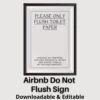What to Expect as an Airbnb Host
When I first considered becoming an Airbnb host in 2016, I found myself in a bit of a pickle. I had this rental property that floundered in the traditional real estate market, and honestly, it felt like Airbnb was my last shot at saving my investment.
If my ventures into short-term rentals didn’t pan out, I’d be facing a hefty loss, and the idea of putting that property up for sale was daunting. But luckily, things turned around for me. So, is being an Airbnb host really worth it? Let’s dive into the nitty-gritty of what you can expect financially.
First things first, the potential earnings I could make as a host depend on a bunch of factors. It’s not just about slapping a price tag on my listing; I need to think about the nightly rate and how many nights get booked each month. Higher bookings generally spell more income.
But let me tell you, it’s not just about creating a listing and waiting for the bookings to roll in. Several elements influence my income potential—property location, local competition, and seasonal demand, to name a few.
Understanding Airbnb’s Payment Policies
A key aspect to grasp is how Airbnb’s payment policy works. It’s a tad different from platforms like Booking.com or Vrbo. Basically, Airbnb charges guests at the time of booking.
There was a time when they required full upfront payment, but now guests can pay part of it and then the rest automatically later. Here’s the catch: I don’t see that money right away!
The funds remain in Airbnb’s system until 24 hours after my guest checks in. Until then, I’m essentially in limbo waiting for my hard-earned cash.
Maximizing Earnings and Minimizing Overheads
Now, let’s chat about how to boost my income. Over my years as a host, I learned that it boils down to two main strategies: maximizing revenue and minimizing overhead costs. To maximize revenue, I need to optimize my listing.
This means providing clear information about my property, the amenities it offers, and nearby attractions. Oh, and the importance of a catchy title and emotive language can’t be overstated. Photos are crucial too; they’re the first glimpse potential guests get, so I aimed to showcase my property beautifully.
In 2022, I discovered Airbnb’s exciting algorithm updates that introduced categories for unique accommodations. Listing in the right category can massively boost visibility, even if my property isn’t in a tourist hotspot. I also made sure to fill out my personal information so that potential guests could connect with me better. And let me just say, positive reviews became my best friends.
Happy guests who leave good ratings really draw in more bookings!
Another tactic I adopted was activating the Instant Book feature, which allows guests to book without having to send inquiries first. This made life easier for them and increased my search attractiveness. Reducing my minimum nightly stay requirements also helped attract a wider audience. One more thing I found vital in increasing bookings: responsiveness. Guests appreciate prompt communication, and I was eager to deliver that.
Building Credibility and Competitive Pricing
Standing out in a crowded marketplace is essential, and achieving Superhost status was like earning a gold star. Maintaining high review ratings and having a low cancellation rate not only granted me this credibility badge but also improved my visibility in Airbnb’s search results.
There’s also a “Guest Favorite” badge for listings that guests love—definitely a nice feather in my cap!
To quickly ramp up my earnings, I learned to regularly tweak my pricing strategy. Pricing could fluctuate based on seasons, holidays, and local events, so staying competitive while covering my expenses was critical. I leveraged dynamic pricing tools to analyze market trends in real-time, which helped me come up with recommended rates. Trust me; this step made a huge difference!
Upselling additional services during a guest’s stay also became a fantastic income booster for me. Think of things like offering early check-ins or local experiences—it’s extra income without a large investment. Thankfully, automation tools like The Host Co made upselling hassle-free.
And here’s something I wish I’d thought about sooner: diversifying my listing. Don’t just rely on Airbnb! Consider platforms like Vrbo, and even social media, to widen your audience reach. Using vacation rental software like Hospitable helped me manage multiple listings effortlessly, ensuring I don’t double-book. No one wants that headache!
The Importance of Cost Management
While ramping up my income was crucial, minimizing overhead costs is equally essential. I learned early on the value of regular property maintenance. Keeping the property in good shape means I avoid costly emergency repairs later on.
On the financial side of things, I realized that I could deduct various expenses tied to running my Airbnb, which helps minimize my tax obligations. Everything from maintenance costs to cleaning services is fair game.
Establishing my direct booking strategy also aided in dodging those pesky Airbnb commission fees. Tools like StayFi helped me gather guest data for direct marketing and reminders about new offerings.
Finally, I became savvy about my purchases, buying essentials in bulk when possible. A few smart investments in durable furnishings paid off too—they stand up to wear and tear much better, saving me money in the long run.
Becoming an Airbnb host isn’t just about wearing many hats; it’s a balancing act between enhancing income potential and managing expenses. The right strategies can make a world of difference as I navigate this rewarding yet challenging landscape. If you’re mulling over the idea of entering this arena, I’d say it’s well worth exploring! Trust me; it’s a wild ride filled with opportunities and learning along the way.
Maximizing Your Revenue as an Airbnb Host
When I first dived into the world of Airbnb nearly six years ago, things were pretty stressful. I had a rental property that was languishing in the traditional real estate market, and quite frankly, I was feeling the pressure. It was like I was standing at a crossroads, and I didn’t have many options left. If my leap into short-term rentals didn’t pan out, I could be looking at a heavy loss.
Thankfully, this gamble turned into a rewarding venture, raising a crucial question: is being an Airbnb host genuinely worthwhile? In this discussion, I’ll break down pivotal strategies I used to rake in revenue on the platform, especially if you’re considering giving it a shot yourself.
First, let’s talk numbers because that’s what it often comes down to—the potential earnings as an Airbnb host depend on several key factors like pricing and the frequency of bookings each month. Sure, higher occupancy means a bigger paycheck, but don’t be fooled; there’s so much more that goes into making good money through Airbnb.
The location of the property, the pricing landscape of the local market, the competition, seasonal trends, and overheads all play major roles in determining your financial success. To put it simply, it’s all about supply and demand.
I had to quickly wrap my head around Airbnb’s payment policy, which is quite different from platforms like Booking.com and Vrbo. When guests book, they get charged, but up until a couple of years back, it was full upfront payment. Now, there’s flexibility with some guests paying a portion initially. However, the catch is that I wouldn’t see the money immediately; it stays with Airbnb until 24 hours after the guest checks in. It can feel like an anxious wait, but it’s just part of the game.
As I immersed myself deeper into hosting, I discovered that maximizing revenue boils down to two things: boosting my bookings and keeping my costs low. The way to start? Optimizing my listing. This turned out to be a game-changer for me. I focused on creating an engaging title and description, filled it with emotive language, and detailed all the amenities and attractions nearby.
But let’s not forget the visuals—great photos are your first opportunity to impress potential guests, so I took the time to showcase my property in the best light possible.
Last year, I learned about Airbnb’s algorithm update, which introduced categories for unique accommodations. Listing my property in relevant categories further enhanced my visibility, even though my place wasn’t in a major tourist hub. Personal touches really count! Filling out my profile completely not only helped guests feel a connection but also boosted my credibility. Positive reviews turned out to be another essential ingredient. Happy guests lead to glowing feedback, which in turn attracts more inquiries. It’s a beautiful cycle.
Another aspect I embraced was the Instant Book feature, allowing guests to book my place right away without waiting for inquiries. Reducing the minimum nightly stay also played into attracting searches. In my experience, prompt communication was key—guests loved getting quick responses to their questions. It was like adding rocket fuel to my booking rates!
Achieving Superhost status became an aspirational badge of honor for me. It not only signals credibility but also enhances visibility in search results.
Maintaining high review ratings while keeping cancellations low felt like a marathon, but the reward was totally worth it. Plus, I found out about the “Guest Favorite” badge that highlights popular listings—talk about motivating me to up my game!
To rapidly increase revenue, I needed a keen eye for pricing strategy. I learned that accommodation prices fluctuate with seasons, holidays, and local happenings. I explored dynamic pricing tools that analyzed market trends, providing me with recommended rates to stay competitive while ensuring I cover my costs.
Another lucrative strategy was upselling services during a guest’s stay. This could be anything from offering early check-ins to showcasing local experiences for an additional fee. Partnering with services like The Host Co helped automate this process, making it easier to manage and yield extra income.
While I focused heavily on Airbnb, I also recognized the importance of diversifying my listing visibility across platforms like Vrbo and even social media. Using vacation rental software like Hospitable let me manage listings across channels without the headache of double bookings.
However, even with a potential income boost, minimizing costs was equally important. Regular property maintenance became my best friend. By preventing small issues before they morphed into costly emergencies, I was on the winning side of the equation.
On the financial side, I learned that I could deduct various running expenses linked to my Airbnb, significantly easing my tax burden. Every dollar counts, right? Initiating a direct booking strategy helped me dodge hefty Airbnb commission fees. By utilizing systems like StayFi, I collected guest data for tailored marketing outreach.
Lastly, I made practical bulk purchases for necessities and carefully selected long-lasting furnishings. Opting for durable options saved me plenty of headaches in the long run.
Overall, the journey of being an Airbnb host demands effort and dedication, but for those willing to embrace the challenges, the rewards are certainly significant—both financially and in terms of making connections. If you are in the throes of deciding whether to take the plunge, my experience tells me it’s worthwhile to give it a go!
Minimizing Overheads and Maximizing Profits
Smart Maintenance Strategies to Reduce Costs
A key takeaway from my experience is the importance of regular maintenance. I don’t mean scrambling for a handyman after something goes awry. Instead, I’m talking about being proactive—like scheduling routine inspections and maintenance checks.
This approach has saved me a ton of money in the long run. The last thing I want is to fork out big bucks on emergency repairs when something small could have been addressed earlier. Think of it as an investment; maintaining your property not only keeps it in tip-top shape but also enhances guest satisfaction, which in turn leads to positive reviews.
Did you know that hosts can save up to 30% on supplies by purchasing in bulk? Seriously, I embrace this whenever I can. Stocking up on essentials not only minimizes frequent shopping trips but also helps keep the expenses under control. I’ve developed a little system for keeping tabs on what needs restocking—I keep a list on my fridge. It sounds simple, but it works like a charm.
Understanding Tax Benefits
Now let’s talk about something that often trips hosts up: taxes. The good news is that many expenses related to running your Airbnb can be dropped off your tax bill. Yes, I’m talking about cleaning supplies, maintenance costs, and even marketing expenses. It’s a bit like finding hidden treasures among your paperwork! Understanding the deductions available can significantly lower your federal tax obligations.
“Every penny saved is a penny earned; smart management is key to thriving as a host.” – Financial Analyst
I remember the first time my accountant explained my potential deductions; it felt like Christmas came early. It was eye-opening to learn how many costs I could write off. I took the time to educate myself about these benefits, and the effort paid off. Researching local tax laws and even consulting with a tax professional made a big difference in my financial planning.
Direct Marketing Strategies to Enhance Visibility
Now, while I was focusing on keeping costs in check, I realized that I also had to boost my visibility to attract guests. I started to think beyond just listing on Airbnb. One effective way I found to do this was through direct marketing.
Using tools like StayFi, I began collecting guest data which allowed me to reach out through emails or special offers. This kind of strategy not only saves on commission fees but also gives me direct control over my bookings.
Building a direct relationship with guests has significant advantages. I send out emails with personalized reminders about upcoming opportunities, as well as special deals for return visitors. It’s all about creating a sense of connection that makes guests feel valued. Plus, who doesn’t love a good deal?
Embracing the Lifestyle: Why Hosting Is More Than Just Income
From my own experience, the most enriching aspect of hosting is the remarkable personal growth that comes with it. Hosting isn’t just a hustle; it’s a powerful opportunity to meet people from all walks of life.
Over the years, I’ve welcomed about 50 guests annually—each one bringing a unique story, culture, and perspective. These encounters can genuinely reshape how you view the world. Besides the financial component, it’s the narratives shared over breakfast or the shared laughter during late-night chats that have become priceless to me.
“It’s not just about the money; it’s about the stories we gather from every guest.” – Experienced Airbnb Host
Networking has also played a huge role. Initially, I started as a host to make ends meet, but I ended up building relationships with folks I might have never met otherwise. Whether it’s bonding with a guest from another country or receiving tips from seasoned hosts, I’ve discovered a wide range of networks that have enriched my life. Uniting different backgrounds has provided me with perspectives I didn’t know existed, allowing me to grow in understanding and empathy.
I’d also like to chat about the flexibility hosting offers. One of the best things about being my own boss is crafting a schedule that fits my life. Sure, there are days filled with cleaning and preparing for guests, but those same days allow me the freedom to take a spontaneous day trip or catch up with friends whenever I like.
That kind of self-employment isn’t something I took lightly. It often means balancing work and leisure, which can be tricky sometimes. But trust me, the ability to decide my daily agenda is truly liberating.
Now, let’s tackle the often misunderstood work-life balance in the hosting game. Many external observers might see it as an avenue to easy income, but the reality is that it requires dedication, creativity, and strategic planning. To maximize revenue, I’ve devised a plan to both boost bookings and manage costs.
The properties that succeed consistently are the ones that adapt and thrive on change. In my case, optimizing my listing with beautiful photographs and captivating descriptions became crucial. A smartly crafted profile goes a long way in attracting potential guests.
What surprised me was how much power Airbnb’s platform held regarding booking strategies. An informed host knows how to maneuver around the algorithm to ensure their property stands out. For instance, I learned about Instant Booking, which lets guests book without lengthy correspondence. It’s a small detail, but I’ve noticed it significantly increases my chances of securing bookings. Plus, it’s not just about ranking higher; it’s also about creating memorable experiences for my guests that will translate into glowing reviews.
Speaking of reviews, that brings me to another crucial aspect of hosting; nurturing guest relationships. Satisfied guests are often eager to share their positive experiences.
Good ratings feed into the Airbnb algorithm, enhancing your visibility in searches and helping you establish that all-important credibility. Interestingly, achieving Superhost status has not only provided me better exposure but has also made me proud of the standard I maintain. It’s a badge of honor, a testament to my dedication to my guests’ comfort and satisfaction.
But let’s not forget about the economics of hosting. Sure, it can be a great source of income, but only if you keep an eye on your expenses. I quickly learned to utilize tax deductions for maintaining the property, cleaning services, and even small improvements.
Establishing a direct booking strategy has also saved considerably on commission fees that Airbnb takes. By investing in a bit of software to manage listings across various platforms, I’ve avoided double bookings and streamlined my operations.
In summary, the life of an Airbnb host might seem like a daunting task at first, but for those open to the adventure, the rewards are deep and meaningful. The opportunity for personal growth, the friendships formed, and the flexibility of self-employment make this lifestyle fulfilling.
Of course, hosting requires a commitment, but if you’re thinking about taking the plunge, my advice is simple: dive in and see how it suits you! Embrace the chaos, the laughter, and everything in between. Trust me, it could lead to a rewarding journey you never expected.
TL;DR: Hosting on Airbnb is more than earning income; it fosters personal growth, diverse connections, and offers flexibility. Although it requires commitment, the enriching experiences make it a rewarding lifestyle choice. If you’re considering hosting, dive in and see the wonders that unfold!









